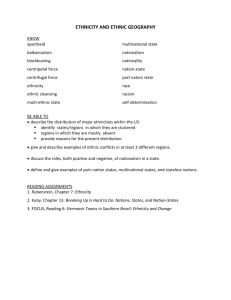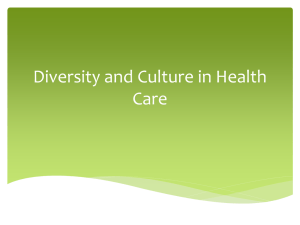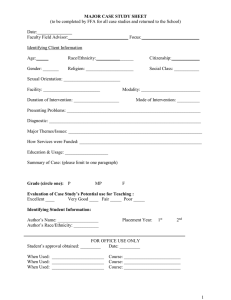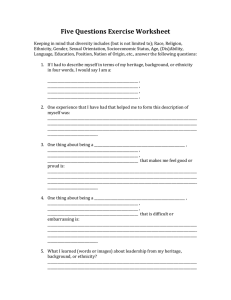Anthropology 3310A Anthropology of Ethnicity and Nationalism Spring Semester 2003
advertisement
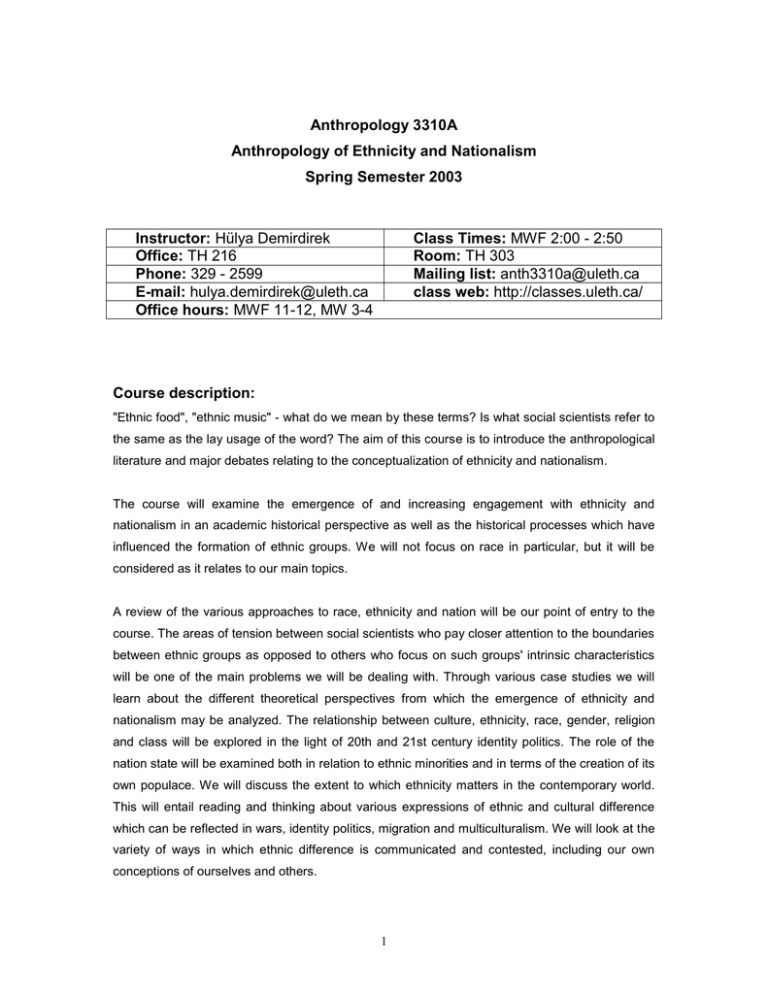
Anthropology 3310A Anthropology of Ethnicity and Nationalism Spring Semester 2003 Instructor: Hülya Demirdirek Office: TH 216 Phone: 329 - 2599 E-mail: hulya.demirdirek@uleth.ca Office hours: MWF 11-12, MW 3-4 Class Times: MWF 2:00 - 2:50 Room: TH 303 Mailing list: anth3310a@uleth.ca class web: http://classes.uleth.ca/ Course description: "Ethnic food", "ethnic music" - what do we mean by these terms? Is what social scientists refer to the same as the lay usage of the word? The aim of this course is to introduce the anthropological literature and major debates relating to the conceptualization of ethnicity and nationalism. The course will examine the emergence of and increasing engagement with ethnicity and nationalism in an academic historical perspective as well as the historical processes which have influenced the formation of ethnic groups. We will not focus on race in particular, but it will be considered as it relates to our main topics. A review of the various approaches to race, ethnicity and nation will be our point of entry to the course. The areas of tension between social scientists who pay closer attention to the boundaries between ethnic groups as opposed to others who focus on such groups' intrinsic characteristics will be one of the main problems we will be dealing with. Through various case studies we will learn about the different theoretical perspectives from which the emergence of ethnicity and nationalism may be analyzed. The relationship between culture, ethnicity, race, gender, religion and class will be explored in the light of 20th and 21st century identity politics. The role of the nation state will be examined both in relation to ethnic minorities and in terms of the creation of its own populace. We will discuss the extent to which ethnicity matters in the contemporary world. This will entail reading and thinking about various expressions of ethnic and cultural difference which can be reflected in wars, identity politics, migration and multiculturalism. We will look at the variety of ways in which ethnic difference is communicated and contested, including our own conceptions of ourselves and others. 1 Learning objectives: learn the main anthropological approaches to ethnicity and nationalism, apply and evaluate these approaches, think critically in anthropological terms about examples of ethnic conflicts and identity politics connect and locate theoretical approaches along a historical trajectory exchange knowledge and ideas in written and oral forms Course requirements: This course is a combination of lectures, films and five weeks of student presentations and discussions. Attendance will influence your performance indirectly since there are several small tasks - rather than any single major one - to be accomplished. There will be three in-class quizzes, two discussion questions to be submitted on seven occasions (the best five pairs of questions will be counted), two discussion questions to be submitted on each of the five case studies (i.e. on three occasions: 2+2+1), library work, group work and a paper. The library work, group work and paper are all related and contribute to one other. The details of each task are explained below. Grading: A+ = 100 - 95 % A = 94 - 90 % A- = 89 - 85 % B+ = 84 - 80 % B = 79 - 75 % B- = 74 - 70 % Weighting: C+ = 69 - 65 % C = 64 - 60 % C- = 59 - 55 % D = 54 - 53 % F: 49 % and below Marking: Quizzes (3 x 10 % each) 3 quizzes, each 10 points (Total 30 points) Paper (25 %) Paper 100 points (Total 100 points) Group work (10 %) Group presentation 10 points (Total 10 points) Library work a. (15 %) Library work a: 15 points Library work b. (5 %) Library work b: 5 points (Total 20 points) Question production a. (10 %) Question production a: 10 points Question production b. (5 %) Question production b: 10 points (Total 20 points) 2 Evaluation will be based on Three in-class quizzes (each 10 %) Quizzes will be comprised of very short answer questions and/or definitions. The questions will test your knowledge of the main points of the readings and films and are intended to help you formulate your knowledge (in one or two sentences) on the basis of the readings/films. Group presentation and discussion (10%): The preparation period will help you to accomplish your own individual assignments and at the same time contribute to the group work. There will be five groups, the size of which will depend on the size of the class. This task will involve intensive library research. All the members of a group will read one of the five books in its entirety and find reviews, other books or articles which refer to that book extensively as well as books and articles which are produced about the same geographical area and/or topics. The aim is to learn about the case study, examine the way in which the author(s) present(s) and analyze(s) the case, place the author(s) within the theoretical map of schools of thought and examine the debate the book has created. An oral presentation will then be made to the rest of the class. You need to make a division of labour: all members of the group must work on the presentation of an aspect or section of the book; clearly, however, responsibility for the final oral presentation of each aspect/section must be assigned to one person. The presenters' task is to introduce the key arguments and lead a discussion. Those of the students who form the audience for each presentation will find and read in advance one book review only of the book in question. It is not mandatory for them to read the book. The audience will be encouraged to challenge the presentation group in a constructive manner, both in terms of what they covered and how they presented their arguments. This group work does not require a great deal of work outside of the class time. We will allocate one chat room to each group on WebCT. In this way you will not need to struggle to organize meetings. Marking will be on the basis of the collective outcome. Under normal circumstances all group members will get the same grade. However, if there are significant discrepancies in the contributions made by various members, they will be given individually adjusted marks. Please keep in mind that group work facilitates learning and, furthermore, most of the world outside of university life involves some form of group cooperation. Individual paper based on group work (25%): You should begin your paper by outlining the section or aspect of the book which you were responsible for presenting (e.g. the historical context of ethnic relations in the former Yugoslavia, the Quebec nation as a collective individual, the reconstruction of history in Scotland, etc.). After this first section of your paper (at most four pages in length), you should then develop a critical reading in the second part. You can choose a particular theoretical problem and discuss it by 3 making a comparison with other approaches and case studies; alternatively, you can examine the ethnography presented by the author from a different perspective. I am willing to advise further in this regard. The outline sections of individual papers by members of the same group will surely have some common features due to the nature of the group work, but you are expected to incorporate the insights you gained during class discussions and our readings into your paper individually. Clearly, how you develop your arguments in the second section is entirely individual. Question production (15%): a. (10%) Weekly submission of two questions: You should come to the classes with the assigned readings and having prepared two discussion questions every week about the topic of the day/week based on your readings. You have to make sure that you have submitted questions in seven different weeks of lecture classes. The five best marks will count. b. (5%) After each of the three case study presentation weeks (Quebec, Yugoslavia etc.), you should submit two discussion questions on each case study (including your own). This means producing a total of ten questions for five case studies. Library work (20%): a. (15%) You have to find five scientific journal articles (anthropological or sociological journals only) and two books which discuss the same region and/or phenomena as the one(s) you have chosen. They should be written by authors other than the author of your particular case study. Please see the WebCT information on how to format the list of references. Your formal assignment is to make a list of these references and submit them to me, but you will benefit from reading or skim-reading some of them to improve your paper and group work. b. (5%) You have to find, copy or print and read one book review for each of the five books which will be presented in the class. Only hard-copy journals or the online versions of hard-copy journals to which our library subscribes will be accepted. You cannot present a book review from an exclusively online source such as Amazon.com. Those of you who are in the same group should make sure that there will be variation in the book reviews. All five book reviews are to be brought to the class on 24 February. Extensions for late submissions can only be given under extraordinary circumstances. Please either contact the instructor in advance or provide documentation (medical or other). Essays which are turned in late without prior approval will have five points deducted per day (here, a day means 24 hours; if the submission deadline is March 27, 12:15, an essay which is submitted after 12:25 on March 27 but before 12:15 March 28 will have five points deducted). Essays which are submitted late are to be handed to the Anthropology Department Secretary (TH 210). 4 Textbook: Eriksen, Thomas Hylland, 1993 Ethnicity and Nationalism, Anthropological Perspectives, London: Pluto Press. Other reading materials are available on reserve at the library. Schedule and deadlines: January 27 Quiz 1 February 24 Bringing the five book reviews March 3 QUE. 1. Submission of Bosnia and Rwanda questions March 17 Quiz 2 March 10 QUE. 2. Submission of Scotland and Quebec questions March 19 QUE. 3. Submission of First Nations questions March 24 Submission of paper April 11 Quiz 3 Discussion questions: Seven of the following weeks: (1, 2, 3, 4, 5, 6, 11, 12, 13, 14) Library work: At the start of each group's scheduled presentation day (24, 26 Feb., 3, 5, 10 March) Please note: 1. Assignments are to be submitted at the start of the class on the due day. 2. If you are unable to attend the class that day please make sure that you submit your assignment either through a classmate or to the anthropology secretary. She has to confirm your submission by noting the time and date on your assignment. 3. ASSIGNMENTS which are pushed UNDER MY DOOR will NOT be ADMITTED unless you speak to me in advance. 4. Uncollected quizzes or assignments can be picked up from the anthropology office. 5. Quizzes are not cumulative and each will cover only material presented since the last quiz. 5 *Tentative Schedule of Lectures, Films and Readings (* Depending on the progress we make during the classes, we may spend more time on certain topics than on others. This may alter the course schedule to some extent.) WHAT IS ETHNICITY? Week 1 January 6 Overview of the course and introduction January 8 Ethnicity, race and nation, preliminaries Reading: THE ch.1 January 10 Race and its discontents Reading: THE ch.1 http://www.pbs.org/newshour/bb/science/jan97/bones_1-3.html http://www.pbs.org/wgbh/nova/first/ http://www.aaanet.org/stmts/racepp.htm Week 2 January 13 Colonialism and slavery Reading: THE ch.5 January 15 Colonialism and slavery Reading: THE ch.5 January 17 Ethnicity in time Reading: Renan, "What is a nation?" http://www.pbs.org/wgbh/pages/frontline/shows/jefferson/ http://www.victorianweb.org/science/race.htm Week 3 January 20 Ethnic groups and boundaries Reading: Barth "Introduction". January 22 Ethnic groups and boundaries Reading: TH ch. 2 January 24 Ethnic groups and boundaries Reading: TH ch. 3-4 Week 4 January 27 QUIZ 1 January 29 Boundaries at "home" Reading: Tagg, "Teaching American history in Canada" 6 January 31 Film: Cross Cut Alberta I. ETHNICITY AND NATIONALISM Week 5 February 3 National consciousness Reading: Anderson "Imagined communities" ch.1-3 February 5 Modernity and nationalism Reading: Gellner, "Nations and Nationalism", ch.4 February 7 Modernity and nationalism Reading: Gellner ch. 5 Week 6 February 10 Nationalism and communalism Reading: Dumont, "Nationalism and communalism" February 12 Nationalism Reading: THE ch. 6 II. ETHNICITY AND VIOLENCE February 14 Film: We are all neighbours Week 7 February 17-21 - Reading Week (no classes) Week 8 February 24 Ethnic conflict Case: Bosnia Presentation and discussion Reading: Book review February 26 Case: Rwanda Presentation and discussion Reading: Book review February 28 Bosnia & Rwanda cont. 7 III. ETHNICITY AND SELF-DETERMINATION Week 9 March 3 Nations without a state/ Language and ethnicity Case: Highland Scotland Presentation and discussion Reading: Book review March 5 Nations without a state/ Language and ethnicity Case: Quebec Presentation and discussion Reading: Book review March 7 Highland Scotland and Quebec cont. Week 10 March 10 First Nations Case: Canada in Rosen's presentation Presentation and discussion Reading: Book review March 12 First Nations Case: Canada in Rosen's presentation Presentation and discussion Reading: Book review March 14 First Nations Case: Canada in Rosen's presentation Presentation and discussion Reading: Book review Week 11 March 17 QUIZ 2 Submission of paper VI. MIGRATION, MINORITIES AND ETHNICITY March 19 Minorities Reading: THE ch. 7 March 21 Identity politics in a multicultural and plural society Discussion Week 12 March 24 Multiculturalism Reading: THE ch. 8-9 8 March 26 Identity politics in a multicultural and plural society Discussion March 28 Film: Promises Week 13 March 31 Urban ethnicity Reading: Cohen, "The Lessons of Ethnicity" April 2 Migration No reading. April 4 Diaspora No reading. Week 14 April 7 "I am not a racist but" Reading: Brodkin "Global capitalism: What's race got to do with it?" April 9 Back to otherness April 11 Quiz 3 Have a great summer! Books: Bringa, Tone 1996 Identity and Community in a Central Bosnian Village: The Symbolic Construction of Community, Princeton: Princeton University Press. Handler, Richard 1988 Nationalism and the Politics of Culture in Quebec. Wisconsin: University of Wisconsin Press. Malkki, Lissa 1995 Purity and Exile: Violence, Memory, and National Cosmology Among Hutu Refugees in Tanzania, Chicago: University of Chicago Press. Macdonald, Sharon 1997 Reimagining Culture, Histories, Identities and the Gaelic Renaissance, Oxford, NY: Berg. Rosens, Eugene 1989 Creating Ethnicity: The process of Ethnogenesis, London: Sage. Periodicals such as Ethnic and Racial Studies, Nationality Papers, Nations and Nationalism, Theory and Society, Annual Review of Anthropology would be useful to browse for relevant topics. 9 Full reference of the readings: Anderson, Benedict 1983 Imagined Communities, chap. 1, 2 London: Verso, pp.10-16. Barth, Fredrik 1969 "Introduction" in F. Barth (ed.), Ethnic Groups and Boundaries, Oslo: Universitetsforlaget, pp.9-38. Brodkin, Karen 2000 "Global capitalism: What's race got to do with it?", American Ethnologist, 27 (2): pp.237-256. Cohen, Abner 1974, "The Lesson of Ethnicity" in A. Cohen. (ed.) Urban Ethnicity. London: Tavistock Dumont, Louis 1970 "Nationalism and Communalism", in L. Dumont, Religion, Politics and History in India, Paris: Mouton, pp.89-110. Gellner, Ernest 1983 Nations and Nationalism, Oxford: Blackwell, pp. 39-87. 10 11
